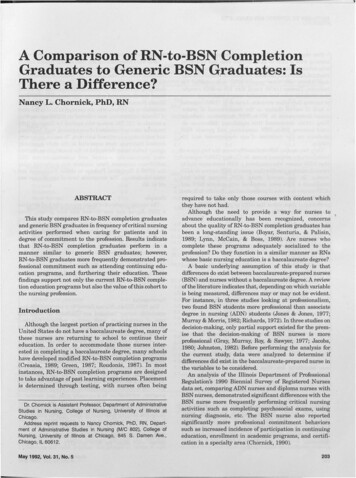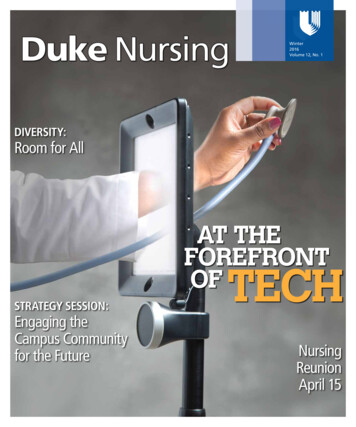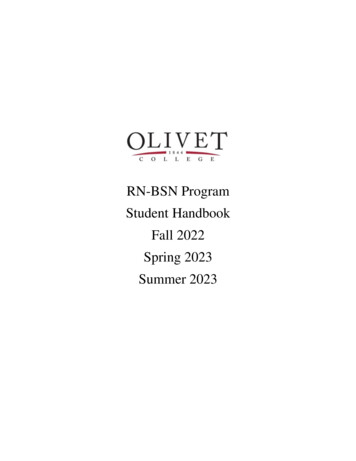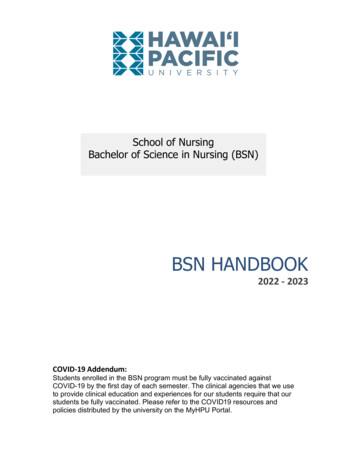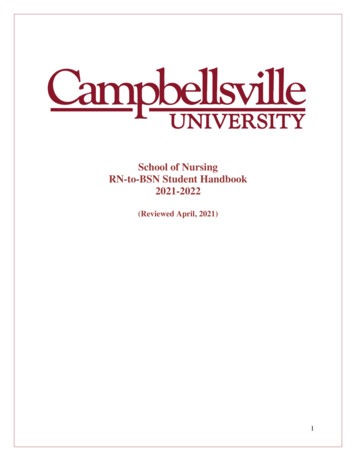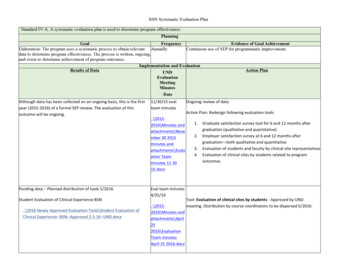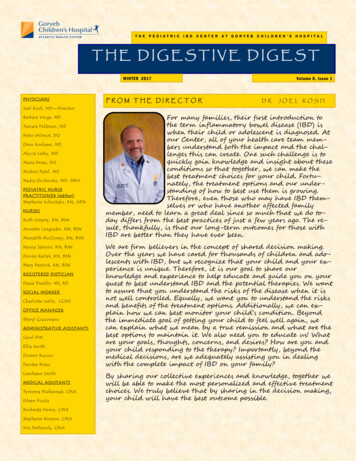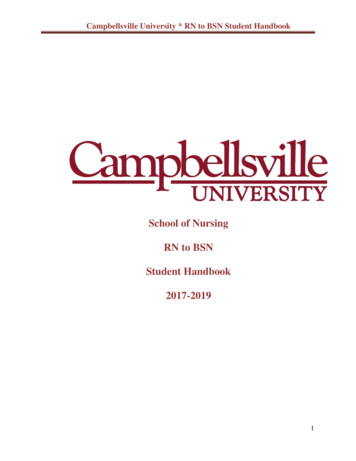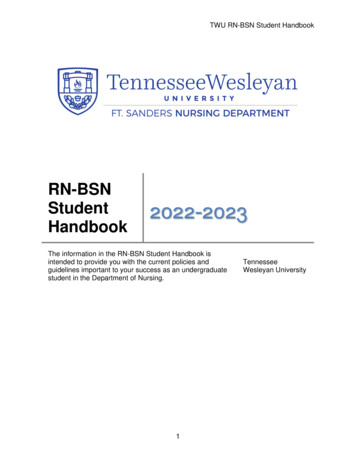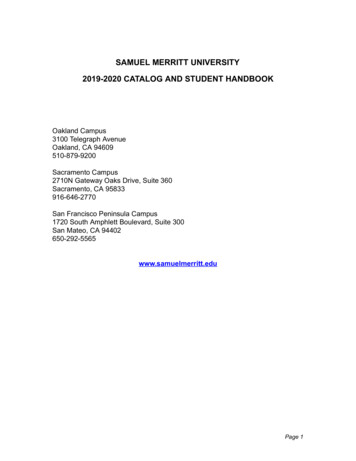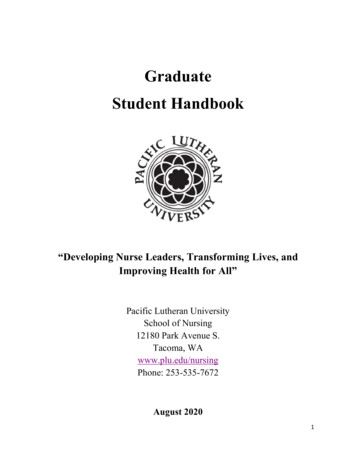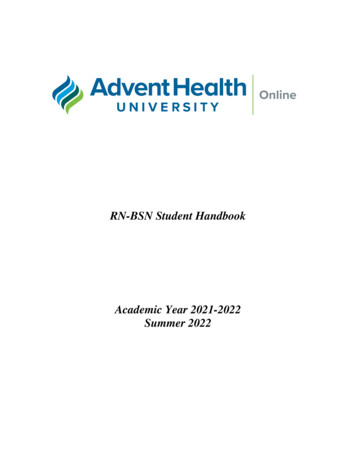
Transcription
RN-BSN Student HandbookAcademic Year 2021-2022Summer 2022
Table of ContentsSection A . 1Introduction . 2Department of Nursing Mission Statement . 2BSN Program Goals . 3Department of Nursing Philosophy . 3CREATION Life Concepts . 4RN-BSN TRACK DESCRIPTION . 6ONLINE EDUCATION . 6LEARNING OUTCOMES . 7RN-BSN CLINICAL COMPETENCIES . 8CLINICAL EXPERIENCES . 9SERVICE-LEARNING ACTIVITIES . 9STUDENT PARTICIPATION . 9RN-BSN TRACK ADMINISTRATIVE AND ACADEMIC PERSONNEL . Error! Bookmarknot defined.AdventHealth University . Error! Bookmark not defined.Faculty and Staff. Error! Bookmark not defined.CONTACT INFORMATION . Error! Bookmark not defined.RN-BSN TRACK POLICIES . Error! Bookmark not defined.PROFESSIONAL BEHAVIORS DURING CLINICAL . Error! Bookmark not defined.ACADEMIC AND PROFESSIONAL INTEGRITY . Error! Bookmark not defined.NETIQUETTE GUIDE FOR ONLINE COURSES . Error! Bookmark not defined.DISCIPLINARY POLICY . Error! Bookmark not defined.CONFLICT RESOLUTION / GRIEVANCE . Error! Bookmark not defined.DISCIPLINARY ACTION DOCUMENTATION FORM . 27Section B . 29BRIDGE TRACK (for Diploma Graduates) . Error! Bookmark not defined.REGULAR TRACK (for Associate Degree in Nursing Graduates) . Error! Bookmark notdefined.STUDENT RESOURCES . Error! Bookmark not defined.NURSING COURSE DESCRIPTIONS. Error! Bookmark not defined.COURSE SELECTION . 37RECOMMENDED COURSE PLAN . 38i
Section A1
DEPARTMENT OF NURSING MISSION STATEMENTIn harmony with the Mission of the University, the Department of Nursingprovides educational experiences within a Christian environment, designed topromote excellence in nursing.IntroductionCongratulations on the decision to pursue a Baccalaureate of Science in Nursing atAdventHealth University. You may have just recently graduated and earned yourregistered nurse license, or perhaps you have been planning for a while to further yourprofessional education. Whether you are a novice or an experienced nurse, you havemade the first step in turning that dream into an action-oriented goal. To make this goal areality, the RN-BSN Track is designed to meet a variety of student needs.The RN-BSN Track Student Handbook includes essential information that will help youunderstand the philosophy, requirements, and policies specific to the nursing program.This handbook supplements the general information found in the Academic Catalog.With this information, the Academic Catalog, and the guidance of the advisor, the studentwill develop a study plan that is individualized and workable.Department of Nursing Mission StatementIn harmony with the AdventHealth University’ Mission Statement, the Department ofNursing develops nurse leaders who live the healing values of Christ. Faculty provideeducational experiences within a Christian environment, designed to promote excellencein nursing. Furthermore, the Department provides educational opportunities for studentsto explore and develop university values of nurture, excellence, spirituality, andstewardship as related to nursing leadership.Nurture. Nurture encompasses working with others including nursing colleagues,inter-professional entities, community members, patients, and families. Graduatesare equipped to deal effectively with change, assist team members to workcollaboratively, and apply critical thinking skills to manage and work withindividuals as well as systems.Excellence. Excellence in leadership is promoted through the study of qualityinitiatives and the safety issues inherent in today’s healthcare milieu. Graduatesare able to utilize evidence-based practice, provide data and guide others in vitaldecisions made in healthcare and higher education.Spirituality. Spirituality directs and guides graduates in the practice of Christianprofessionalism. Guided by Christian ethics and biblical standards, graduatesprovide vision, offer solutions and assist the organization to operationalize itsmission of offering healthcare as ministry.Stewardship. Stewardship is also part of the repertoire of graduates as they useorganizational resources judiciously. As conscientious stewards, graduates are2
respectful of the time, effort and resources available to patients and families,coworkers, and the community at large.BSN Program GoalsThe Goals of the BSN program are to educate students to:1. Demonstrate caring, Christian principles in professional nursing practice roles in amulti-cultural, global society who embrace the core values of AHU.2. Provide excellent generalist nursing care that improves patient safety andpopulation health outcomes.3. Incorporate scientific, evidence-based knowledge from the sciences, humanities,and arts to lead change in the health care system while collaborating withinterprofessional teams.Department of Nursing PhilosophyThe faculty believe that the discipline of nursing is both an art and a science thatpromotes health through the delivery of wholistic care to individuals, families, andcommunities. The Department of Nursing uses the Neuman Systems Model as aframework for understanding professional, health-oriented service to individuals,families, and communities.The practice and teaching of nursing is a calling to exercise God’s gifts in a life ofservice to humanity. Through the profession of nursing, graduates extend the healingministry of Christ by practicing healthcare as ministry. Faculty and students, guided byChristian principles, achieve personal and professional excellence through qualityeducation and life-long learning.Integrating the concepts from the Neuman Systems Model and AHU’s Christianprinciples, the curriculum addresses the four metaparadigm concepts of nursing: (a)person, (b) environment, (c) health, and (d) nursing as follows.Person. A person is a child of God who is an integrated whole, and created to livein harmony with God, self, and others. A person also is a patient or client systemwho may be the learner, the faculty, the support staff, an individual, family, orcommunity. The patient or client system consists of five integrated variables thatinclude physiological, psychological, socio-cultural, developmental, and spiritualfactors. These variables are integrated into the nursing curriculum to preparegraduates with the capacity for caring, compassion, critical thinking, and respectfor the dignity and self-determination of others. The nursing faculty arecommitted to caring, compassion, critical thinking, and respect for students bymodeling these behaviors in the delivery of the curriculum.Environment. The environment is all of God’s creation. The environment is anopen and dynamic system consisting of intrapersonal, interpersonal, and extrapersonal forces influenced by, and influencing the person’s response to stressors.3
The external environment may consist of virtual classrooms, teaching andlearning media, practice settings, the student’s home, and professionalemployment settings. Internal environments may include spiritual, cultural,psychological, social, and physiological factors that impact teaching, learningtransactions, and the capacity for learning. These environmental factors are builtinto the planning, design, implementation, and evaluation of the curriculum.Health. Health is a continuum of wellness to illness and is dynamic in nature.Optimal wellness or stability is achieved when the total patient or client systemneeds are met. A reduced state of wellness is the result of unmet patient or clientsystem needs. Health is dependent on the interplay of internal and externalresources to support the patient or client system. The nursing curriculumadvocates for the health of self and others and is designed with a focus on healthpromotion, health maintenance, disease prevention, and health restoration.Therefore, the eight principles of health include C-Choice, R-Rest, EEnvironment, A-Activity, T-Trust, I-Interpersonal Relationship, O-Outlook, andN-Nutrition (CREATION), and are embedded throughout the curriculum.Students engage in health-related activities across the lifespan that benefit theindividual, family, community, and society to enhance optimal functioning.Nursing. Nursing is both an art and a science that promotes health through thedelivery of wholistic care to individuals, families, and communities. Nursing is adynamic, interactive process and treats human responses to stressors throughoutthe life span. The curriculum is structured with a focus on the development ofnurses who are accountable and responsible for developing and delivering caring,compassionate, wholistic nurse-patient or client system interactions. Theseinteractions are extended through the healing ministry of Christ. Students arenurtured by faculty and learn to nurture others. Pedagogical excellence is modeledin preparing students for patient or client-focused professional nursing care usingevidence-based practice.CREATION Life ConceptsC-Choice – accept responsibility for optimal healthR-Rest – enjoy replenishing sleep and relaxationE-Environment – create nurturing, rejuvenating surroundingsA-Activity – put the body into motionT-Trust – express faith and belief in GodI-Interpersonal relationships – cultivate and celebrate relationshipsO-Outlook – practice a positive, happy attitudeN-Nutrition – provide fuel for high performance throughout lifeNote: Students are encouraged to review the application of each of the elements thatcomprise CREATION Life at the following website: http://www.creationlife.tv/4
Definition of Terms in the Neuman Systems ModelBasic Structure: The basic structure consists of common client survivalfactors related to system variables, as well as unique individualcharacteristics.System variables: Physiological, psychological, socio-cultural,developmental, and spiritual factors.Lines of Resistance: The lines of resistance protect the basic structure.These lines are activated following stressor invasion of the normal lines ofdefense.Normal Lines of Defense: An adaptation level of health developed overtime and considered normal for a particular individual client or system; itbecomes a standard for wellness deviance determination.Flexible Lines of Defense: Protective system for the client’s stable state.Ideally it prevents stressor invasion and protects the normal line ofdefense. It is strengthened by primary prevention.Stressors: Environmental factors that are intra-, inter-, and extra-personalin nature and have the potential for disrupting system stability bypenetrating the system lines of defense and resistance. A stressor isinherently neutral or inert. The outcomes may be either positive ornegative. The client system’s perception of the stressors and copingabilities are major considerations for caregivers and clients.Intrapersonal stressors: The internal environmental forces that occurwithin the boundary of the client system.Interpersonal stressors: The external environmental interaction forces thatoccur outside the boundaries of the client system at the proximal range.Extra-personal stressors: The external environmental interaction forcesthat occur outside the boundaries of the client system at the distal range.Primary Prevention Level: Interventions before a reaction to stressors hasoccurred.Secondary Prevention Level: Interventions after a stressor reaction hasoccurred (but before complications occur).Tertiary Prevention Level: Interventions following treatment of a stressorreaction (but before complications develop into residuals).5
Reaction: Response based on the perception of the stressor by the basicstructure and may occur in varying degrees.Intervention: Any preventive mode of action that modifies an actual orpotential stressor at the primary, secondary, or tertiary level. These modesof action can be implemented by the client system, significant other,family, community, nurse, or other health care provider.Reconstitution: Represents the return and maintenance of the systemstability following treatment of a stressor reaction which may result in ahigher or lower level of wellness.RN-BSN TRACK DESCRIPTIONThe Baccalaureate of Science in Nursing (RN-BSN Track) is designed to prepareregistered nurses to provide wholistic health care to individuals, families, andcommunities. The program is grounded in Christian principles and integrated withcourses from the arts and sciences that enrich the course of study and contribute to thedevelopment of a broader worldview of nursing. The program provides a foundation forthe graduate to enhance professional growth, facilitate career mobility, and establish afoundation for graduate studies.ONLINE EDUCATIONThe RN-BSN Track courses are offered entirely online. These include opportunity forreal-time (synchronous) interaction with faculty and peer students. Asynchronousinteractions in discussion forums foster collaboration, cooperation, community-buildingthrough student engagement, learning accountability, and strong faculty presence.Collaborative activities and other interactive content enhance comprehension andretention. Class discussions may include opportunity for real-time (synchronous)interaction with faculty and peer students. Opportunities to learn from practical realworld involvement and activities demonstrate relevance of coursework to the practiceenvironment. Online learning provides education to students located anywhere withoutcompromising, quality, rigor, or integrity.6
LEARNING OUTCOMES The AHU graduate will be a caring professional who possesses a willingness tonurture other individuals in the context of healthcare as a ministry. The RN-BSN graduate will integrate caring, Christian principles to guideinteractions with patients/clients, health care professionals, and the public. The AHU graduate will be an effective communicator who possesses appropriateverbal, nonverbal and written skills in the practice of healthcare as a ministry. The RN-BSN graduate will use effective skills in communication andinformation- management. The AHU graduate will be a critical thinker who gathers relevant information andanalyzes and uses that knowledge in practicing healthcare as a ministry. The RN-BSN graduate will use critical thinking/reasoning/problemsolving skills to address healthcare needs throughout the life span. The AHU graduate will exhibit the characteristics of a Christian professional,treating everyone with respect and dignity in the context of healthcare as aministry. The RN-BSN graduate will evaluate ethical, legal, economic, and politicalfactors that affect the management of health care for individuals, families,and communities. The AHU graduate will demonstrate professional expertise by passing appropriateprofessional examinations and exhibiting proficiencies within the context ofhealthcare as a ministry. The RN-BSN graduate will integrate nursing research and other evidencebased approaches for use in safe practice. The RN-BSN graduate will incorporate community resources to meet theprimary, secondary, and tertiary health care needs of individuals, families,and communities. The RN-BSN graduate will function in the roles of a nurse as a provider,designer, leader, educator, advocate, and coordinator of nursing care asappropriate. The RN-BSN graduate will synthesize knowledge from nursing, the arts,sciences, and humanities to meet patients’/clients’ physiological,psychological, socio-cultural, developmental, and spiritual needs. The AHU graduate will be one who fulfills social, civic, and environmentalresponsibilities by involvement of healthcare as a ministry. The RN-BSN graduate will support the principles of social justice asrelated to service learning in the community. The AHU graduate will be a lifelong learner who pursues excellence and theongoing acquisition of knowledge and professional expertise. The RN-BSN graduate will participate in activities that foster on-goingprofessional growth and development in self, others, and the profession.7
The University learning outcomes and the RN-BSN Track learning outcomes aremeasured through a series of academic activities that include, but are not limited to:1. The students’ ability to apply APA writing format in academic papers2. The students’ ability to communicate professionally in online discussionforums, group interactions, written and verbal messages, assignments, andinterpersonally3. The students’ ability to progress through the RN-BSN Track with grades ofC or better4. The students’ ability to apply critical thinking on a professional level5. The students’ ability to incorporate theoretical and evidence-based practiceprotocols in written work and practice settings6. The students’ ability to satisfactorily complete clinical projects at theundergraduate level of performance7. The students’ involvement in service-learning activities in the communityRN-BSN CLINICAL COMPETENCIESAs a basis for planning the curriculum, the faculty identified areas of professional growththat differentiate the practice of an A.S. graduate from that of a B.S. graduate. Thefaculty recognize the need to develop the student’s skills to function in community,clinic, as well as inpatient hospital environments, and thus include two specificallycommunity-based courses. To develop a nurse who is “provider of care, designer/manager/ coordinator of care and a member of a profession” (AACN Essentials ofBaccalaureate Education, p. 7), the following 8 characteristics of professional practicewere selected by the faculty to guide clinical experiences: Provider of care:A. The graduate of the RN-BSN Track will demonstrate the ability to:1. Integrate theory and practice2. Practice from an evidence-based perspective (EBP)3. Engage in the fully autonomous aspects of practice (managementof human responses to health problems) Designer/manager/coordinator of careB. The graduate of the RN-BSN Track will demonstrate the ability to:1. Focus attention on planning care for groups as well as forindividuals2. Include preventive and prophylactic interventions as well astherapeutic interventions3. Function as a leader in providing care4. Function as a teacher, not only of patient/family but also of fellowstaff Participation in the maintenance of the professionC. The graduate of the RN-BSN Track will demonstrate the ability to:8
Engage in supportive activities of the profession as a wholethrough contributions and advocacyCLINICAL EXPERIENCESThe RN-BSN Track includes clinical experiences that are integrated into some of thenursing courses. The clinical assignments are completed in community or other healthcare agencies outside of the virtual classroom setting. In courses, with clinicalassignments, the student must complete all components of the clinical assignmentssatisfactorily to pass the course. Failure to complete a clinical assignment may result infailure of the course.SERVICE-LEARNING ACTIVITIESProfessionals have a responsibility to contribute from their professional knowledge,skills, and expertise for the good of the community beyond the details of theiremployment. Therefore, students are required to complete service-learning activities inaddition to the clinical projects. In the RN-BSN Track, these requirements are integratedinto one course, NRSG 335. These activities give students opportunities to becomeacquainted with community needs and develop connections with community leaders whoare engaged in meeting those needs. Students will be expected to wear AHU ID badgesfor these activities as well as certain clinical activities.STUDENT PARTICIPATIONStudents also have an opportunity to participate in departmental Student BusinessMeetings at least once each trimester. Issues of concern are posted as threaded discussionTracks in each nursing course and are open for one week for students to express theirfeelings about the issue under discussion. Students also have opportunities to influenceprogram policy and function through end-of-course and program evaluations as well asdirect discussion with course faculty throughout any course.9
RN-BSN TRACK ADMINISTRATIVE AND ACADEMIC PERSONNELAdventHealth UniversityDepartment of Nursing671 Winyah Drive, Orlando, FL 32803Academic AdministratorDeena Slockett, Ed.D., MBA, RT(R) (M)Senior Vice-President, Operational Strategy and LearningPhone: 407-303-7747 ext. 1101095 / Fax: 407-303-0946e-mail: Deena.Slockett@ahu.eduStudent Services AdministratorsAcademic Operations: Leanna Neubrander @NEUBRANDER, LeannaAdmissions Team: Lillian Garrido @Garrido, LillianStudent Experience Team: Amanda Hayes @Hayes, Amanda (AHU)Dean of Students: Joshua Garrido @Garrido, JoshuaStudent Academic Support Services: Dr. Joyce Anderson @Anderson, JoyceFaculty and StaffAlicia Franco Bruno, PhD, MSN, RNChair, Department of NursingPhone: 407-303-5764 / Fax: 407-303-7893e-mail: Alicia.Franco@ahu.eduLynelle Callender, DNP, RN, INSVice-Chair, Online Nursing ProgramsPhone: 407-513-2294 / Fax: 407-303-0526e-mail: Lynelle.Callender@ahu.eduLeesuk Ferencsik, PhD, RNLead faculty: NRSG 497 – Introduction to Nursing Research for RNsLead faculty – NRSG 486 – Seminar in NursingPhone: 407-303-7747 ext. 110-1084 / Fax: 407-303-1872e-mail: Leesuk.Ferencsik.ahu.eduTina CapparelliAssociate Registrar, RN-BSN TrackPhone: 407-303-7747 ext. 110-1096 / Fax: 407-303-0946e-mail: Tina.Capparelli@ahu.eduAmanda HayesDirector of Online Student ExperiencePhone: 407-362-1557 / Fax: 407-303-0946e-mail: Amanda.Hayes@adu.edu10
24/7 Help Desk Technical Support:Toll Free Telephone: 1-877-642-1902Submit a ticket or a live chat on the Canvas systemCONTACT INFORMATIONThe information in this section is provided to assure that students are able to utilize thefull array of course support that is provided by AdventHealth University.Contact Sequence (See roles below)Address course content questions in the following sequence:Lead Faculty and then Online Nursing Vice-Chair.Address process questions (“how do I ”) in the following sequence:Lead Faculty for course details; Academic advisor for registration detailsDirector of Student Success and Retention (Amanda Hayes)The Director of Student Success and Retention also is available M-F 8:30am - 5:30pmto assist you with contacts or finding any other information you may need.Address Technological Questions:1. Contact the 24/7 Help Desk to document the issue, receive immediate assistance, andobtain a problem identification number.Toll-free 24/7 telephone access at 1-877-642-1902 or send email to external e-mail:Submit a ticket or the live chat on the Canvas system.2. Contact the Director of Online Student Success and Retention and/or course LeadInstructor.Section Adjunct Instructor (in some courses)The Section Adjunct Instructor is responsible for the following activities:1. Moderating small group activities.2. Facilitating students’ understanding of course concepts.3. Monitoring and responding to discussion board postings.4. Engaging students’ active participation in the course content.5. Grading student assignments in a timely manner (within 6 calendar days) andproviding feedback to the student.6. Monitoring and recording weekly student participation in the course.7. Contacting students not actively participating in the course.8. Coaching students based on performances recorded in the gradebook.9. Responding to student questions within 24 hours (during week) 48 hours (weekend).10. Notifying the Lead Faculty/Course Coordinator of students not actively participatingin the course.Students should contact the Section Adjunct for the following issues:1. Clarification regarding assignments and quizzes.11
2. Clarification regarding understanding of the course content.3. Inability to attend any group appointments.4. Concerns related to performance in the course.Lead Faculty / Course CoordinatorThe Lead Faculty / Coordinator is responsible for the following activities:1. Developing course content, including group activities, live conferences anddiscussion boards.2. Monitoring student discussion forums and participation.3. Analyzing results of quizzes and examinations.4. Monitoring students’ progress in the course.5. Maintaining communication/team meetings with the section adjunct instructors.6. Reviewing requests for extensions / incomplete grades.7. Monitoring the student engagement in the course.8. Recording and submitting final course grades and course data in TaskStream.Students should contact the Lead Faculty for the following issues:1. Questions about the material, including readings, assignments,Multi-media presentations, discussion forums, and group activities notanswered by the section adjunct instructor.2. Course policies or procedures.3. Requests for extensions / incomplete grades.Director of Student Success and Retention (Amanda Hayes)The Director of Student Success and Retention is responsible for the followingactivities:1. Student access to the course website.2. Posting general course announcements.3. Maintaining student records.4. Maintaining databases, including address changes.5. Facilitating course drops and withdrawals.6. Maintaining live discussions and discussion boards.Contact the Director of Online Student Success and Retention for the followingissues:A. Change of Address.B. Non-receipt of course materials.C. Difficulty logging onto the course website.D. Difficulty contacting a faculty member.E. Submitting student-completed Drop/Withdrawal form.Vice-Chair (Dr. Lynelle Callender)The Vice-Chair is responsible for the following activities:1. Faculty and program evaluation.12
2. Implementation of program policies.3. Assignment of faculty.4. Compliance with accreditation and regulatory standards.Contact the Vice-Chair for the following issues:A. Suggestions concerning program improvements/modifications.B. Issues not satisfactorily addressed by the Section Adjunct Instructor and the LeadFaculty/Course Coordinator.Nursing Department Chair (Dr. Alicia Franco)The Nursing Department Chair is responsible for the following activities:1. Oversight of the nursing program.2. Management of nursing faculty and staff.3. Approval of student requests for academic exemptions (petitions).4. Enforcement of compliance with departmental and university-wide accreditation andregulatory standards.Contact the Department Chair for the following issues:A. Suggestions concerning program improvements/modifications.B. Issues not satisfactorily addressed by other program faculty or staff.13
RN-BSN TRACK POLICIESThe following guidelines describe regulations of the program governing specificsituations. Please read this information thoroughly. Students participating in the programare expected to abide by these policies.PROFESSIONAL LICENSUREThe student in the RN-BSN Track is required to maintain an active unencumberedregistered nursing license throughout the course of study. The nursing program reservesthe right to request updated evidence of licensure status at any time. If at any time astudent becomes unlicensed for any reason, is obligated to surrender licensure in anyjurisdiction for disciplinary reasons or experiences any other change in licensure status(e.g., new expiration dates, revocation, suspension, change of names, etc.) the studentmust inform the University of the change. This notification must occur immediately if thestudent is currently participating in a course. If the student is not in a course at the time ofthe change, the notification must occur prior to registering for the next course. A copy ofall licensure changes must be submitted to the Director of Online Student Success andRetention. Please be aware that the University is obligated to report any attempts atmisrepresenting licensure status to appropriate regulatory agencies.CONFIDENTIALITY OF INFORMATIONAll agency and clie
reality, the RN-BSN Track is designed to meet a variety of student needs. The RN-BSN Track Student Handbook includes essential information that will help you understand the philosophy, requirements, and policies specific to the nursing program. This handbook supplements the general information found in the Academic Catalog.
